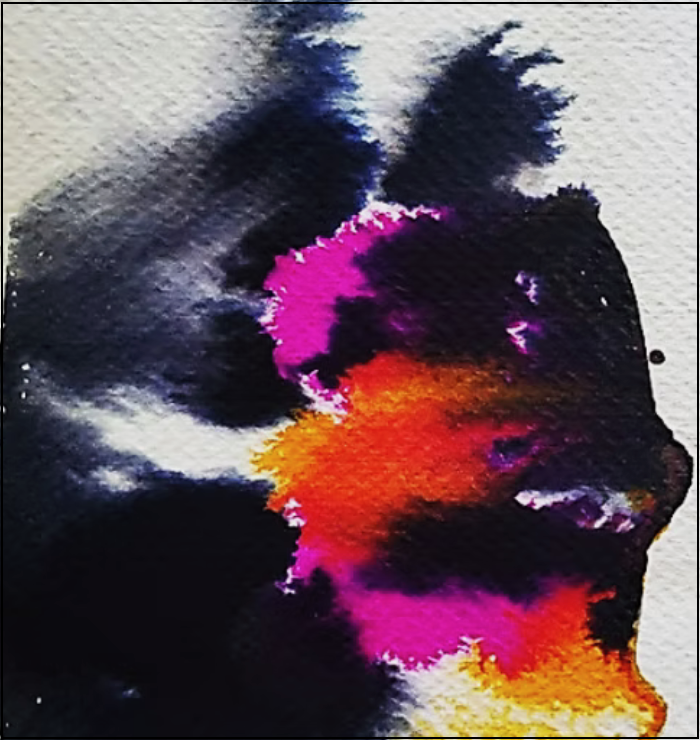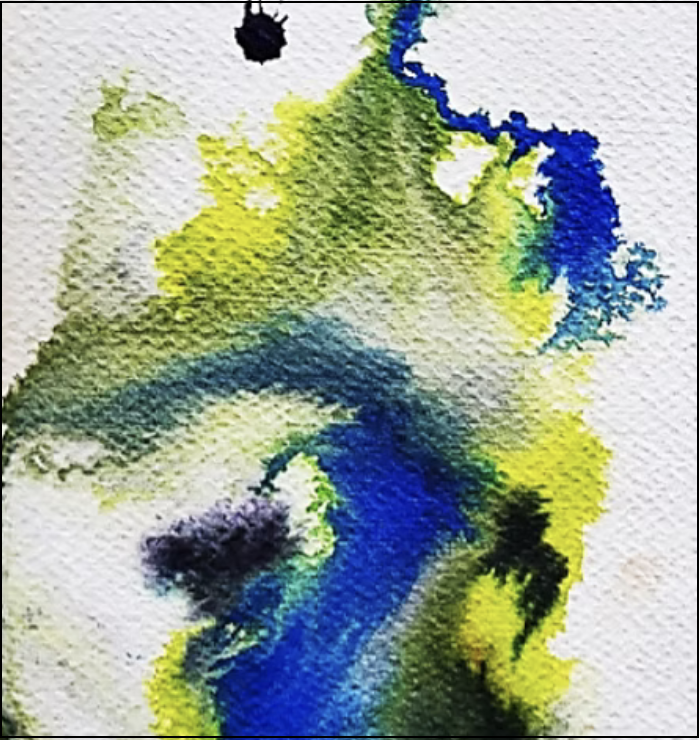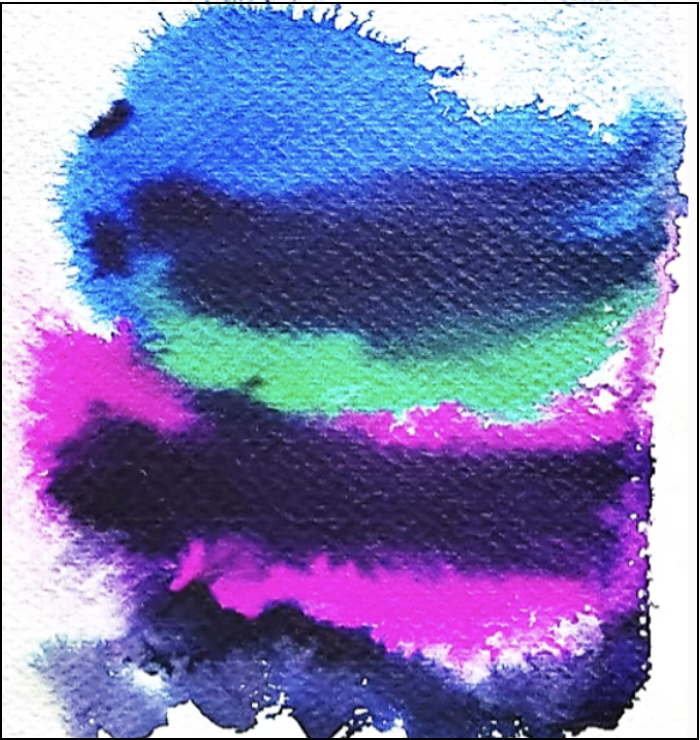In Honor of Christopher Sawyer-Lauçanno
From His Friends and Colleagues
A Note of Introduction
Cable Street’s beloved editor, mentor, friend, and literary colleague, Christopher Sawyer-Lauçanno, passed from this life on October 3, 2024. We invited those who knew him to submit tributes to this remarkable artist and man, who helped so many with his generosity and kindness. We hope their words—interspersed with some of Chris’s watercolors from Learning to Use Black—are a balm to the grief of all who read.

Patrick Pritchett
Of Song and Such
In memoriam, Christopher Sawyer-Lauçanno
There is no such thing as
song says song as it breaks
apart into pieces, as the sky falls apart
and the music of its debris
plunges the wreckage of leaves
scatters them across the lawn
green songs dreaming
green emptiness
everything you ever owned
floating away into nothing
the last song of an animal
who is almost song itself.
There is no such thing
as song—only when you sing
you shape the abyss,
speaking form out of void
words hasped into the grain of wood
syllables hedged against the dark.
A small voice translating starlight,
clairvoyance a glissando of angels.
The true entablature
of the dream of
being here as where else
could we ever be?
Simon Pettet
On Chris Sawyer-Lauçanno
Chris was one of the happiest persons I ever met. Not happy in the dumb blissed stoned oblivious naive sense—quite the opposite! He was an MIT professor, for goodness’ sake! He was among the most intelligent persons I ever met too, though he wore it lightly—sympathetic, understanding and compassionate. I don’t recall when or where we first met—Paris? Istanbul? Massachusetts? I do recall hearing his name (that wonderful exotic polysyllabic name!—surely a grandee!) from the lips of our mutual friend, his French publisher, Karl Orend, and, around that time, getting lost in, and being impressed by, An Invisible Spectator, his Paul Bowles biography. In fact, being impressed by what that might be—to be the biographer of Paul Bowles!
Our friendship was one of mutual respect, mutual respect as poets. I recall reading with him, alongside his good friend, Mark Polizzotti (Andre Breton’s biographer!—I felt humbled in such exalted company). I remember passionate discussions about poets and poetry with another of our mutual friends, our remarkable Talisman publisher, Ed Foster. I was moved when, in later years, Chris asked if I would be willing to write a blurb for his book of poems, Remission. Yes, I said. I most certainly would.
Written at an extraordinarily challenging time in his life, (following the loss of his beloved wife, Pat—alongside his own ongoing perennial critical health issues), Remission shows, surprisingly, no mawkishness, or self-pity, rather, an inspiring commitment to life, to continuing. Still curious—still curious, contemplating its mysteries, but mostly now via simple quotidian observation. I speak there of Chris’s heroic “permanent immediate present.” That quality post-dates his passing. That was one of the particular things I admired in him. He will—happy to say—always be with us.
Pettet’s addendum: I’m so immensely grateful to Bronwyn Mills and Witty Partition (later Cable Street) for providing the forum for Chris to publish a significant body of work, most especially, in eagerly-awaited episodic form, his riveting and revealing autobiography. The young Chris, the mature Chris—I learnt so much about him from that. It truly rounded out the picture for me.

Janel Nockleby
At Your Last Reading
For CSL
at your last reading
separated from its person
a panicked dog barked
left alone
in a truck
next to us
there in the
unnameable
courtyard
your words merged
unflappable
you barked your poems back
in a chorus of keening
Ed Barrett
Breakfast with Chris and Patricia at Charlie’s Kitchen, Cambridge MA, 1993
“Fried eggs’d be nice,” you said. “Fried eggs on night,” I said, “That’s what God eats!” But since you had said it right the first time you didn’t know what I meant either. So we just looked at each other, crammed into one side of the booth while the other couple decided what they wanted. And it was all so fast and so trivial there wasn’t much to say, except that I had heard an order that could only be given in heaven.
Barry Charles Tharaud
In Memoriam
I met Chris in Istanbul in company with Cliff Endres and other friends. At the time, I was working on a book on Paul Bowles, and of course Chris wrote the book on Bowles—the best book: it was the earliest serious biographical work on Bowles, and it therefore had a trove of information that no other work on Bowles has, because Chris was able to contact many intimates of Bowles before they died. As a result, Chris pierced Bowles’s constructed persona on occasion, which earned him the ire of Bowles. Chris took it all with equanimity, and when I ran onto the shoals of political Bowles scholarship, Chris was supportive and understanding: he was kind and helpful and gave me some good advice with my own work, which was published in 2020. All in all, he was a kind, decent man. I wish I had known him a lot sooner. We both attended the same university a few years apart, but it was only later along in life when we finally met.
Leonard Schwartz
A Memory of Grace
I saw Christopher Sawyer-Lauçanno last on September 17th, 2023. It was at the home of an ailing Ed Foster. There, and then when we took Ed to dinner that night, Chris was his usual self, which is to say that unusual combination of care, grace, and brilliance he always brought to his life and his writing. I knew he had been struggling with cancer for a long time, but apart from a certain frailty, he was all there. He must have been that way all the way to end: caring, graceful, and brilliant in his commitment to the presence of the word, which also means to others. I often return to his translation of Chilam Balam: Destruction of the Jaguar and now too to his last book, Night Suite.

Marta López Luaces
Imaginings in Memoriam for Christopher Sawyer-Lauçanno
For Frost’s echoes, I have been one acquainted with the night [1] and los motives of Let us go then, you and I, when the evening is spread out against the sky Like a patient etherized upon a table; Let us go, [2] through the paths less traveled by the gardener of dreams until we reach Pound’s prison where he looks to the south of Lope de Vega and the east of the Haiku, The Cantos of Pisa, polygraphy that exorcises the west from its modernity.
For the lullaby of Hart Crane to Aunt Emily you fed your hunger like an endless task, [3] who breastfeeds from her pristine breasts, overflowing with darkness, so much purity stained with puritan hunger and thirst without being satiated in the ocean of a black angel in whose lap…Are you resting?
For the sky without taste of childhood, sky without the touch of far countries, sky without the memory of death that involves the soul’s entire voyage, sky without a drawing by Breton nor by Michaux, sky without a perfectly open line that recalls el estado de mi cuerpo [4] sky that echoes in the presence of Gide’s sky of invocations—ruddy face of the brimming vortex of modernity—with shooting stars over their heads. Where will my angel be?
For the orphanage that pursues evil like a profession, the orphanage the craziness of a language, the orphanage that pursue the hysteria of a language, the orphanage that pursues the universe that unites life and poetry, the orphanage that pursues(raven perched on the shoulder of life) following the fury of Ibarborou’s grin, the fury of Girondo’s white horse, the fury of the witches’ sabbath’s frenetic dance, HD el secreto de los dioses se encuentra en el idioma de los hombres, [5] persisting in the flight of an owl made of ashes so that it rains libations with a melancholy smell over Storni’s expatriates, but, where will my angel be?
For condemnation absent an act of snow (prophets make mistakes;Tú has hecho conmigo lo que no se debe hacer, [6] said Abimelech to Abraham), pursue the visionary poet without answer, without articulation, who does not act, does not reject, does not accept, does not include, Leviathan, ENDRIAGO of a sign, without dew, without breeze, without spring; sickness of the metaphor, without casting a spell. Celan, why when the sparrows kept replacing souls for our response, you went gentle, gentle into that good night?
For the holocaust of the universe inside of Celan to an apparition that becomes a representation, a representation that becomes an incarnation, an incarnation that becomes a body, a body that becomes a text that becomes a reding, a reading that becomes an apparition for the interior universe of Celan ¿Con cuántos comprenden, y luego a quién? [7]
Translated by G. J. Racz
Author’s footnotes: 1. Robert Frost, Me he familiarizado con la noche; 2. T.S. Eliot, “The Love Song of J. Alfred Prufrock”; 3. Alimentaste tu hambre como una tarea interminable. Versos de Hart Crane a su madre poética Emily Dickinson; 4. The state of my body; 5. The secret of the gods is found in the language of man; 6. You have done with me what you should not have done; 7. How much do they understand, and later for whom?—César Vallejo.
G. Greene
Remembering Chris
I lost my wife Jean after nearly 40 years together in December of 2018. I began writing poetry as a way to express my grief.
It was December of 2020 when a friend suggested I submit some of my works to The Montague Reporter for possible inclusion on the monthly poetry page, which Chris curated.
I emailed Chris and asked how the process worked and he replied directly, saying I need only attach the poems to an email and he’d review them at some point and get back to me, so I selected a number of pieces and off they went. Being a complete unknown, and unpublished to that point, I expected nothing, to be honest.
That same day, just a few hours later, he replied:
Gary,
Thank you for sending these moving, poignant and important poems. The December page is full but I would like to offer you the January page.
Best wishes, Christopher
And so it was I had my poetry published for the first time in January of 2021 in The Montague Reporter. Thus began a friendship that I will treasure for the rest of my days.
Chris visited my house on more than one occasion to relax on my patio as we enjoyed coffee and treats and discussed poetry and life and grief and our shared losses. I participated, at his invitation, in a couple of online readings, and he was kind enough to publish many more of my pieces in the last several years. Chris’ mentorship and encouragement helped lead me to publish two volumes of my poetry. I think neither book would have happened had I not met Chris.
We had made plans for another get together this past summer, but his disease intervened and though we continued to correspond, we never got to share that last pot of coffee.
The poem below, “Clouds” appeared in the Montague Reporter in July of 2024. It was one of the last two of my pieces chosen by Chris to appear on the monthly poetry page.
Clouds
I woke in a cloud
cirrus or stratus
it makes no difference
but I can tell you
clouds are dark
on the inside
and hard to live in.
There’s nowhere to sit
nowhere to hang a coat
and though they look
fluffy and cottony
they’re soaking wet
and cold and clingy
a flooded basement
in the sky
full of sodden memories.
I think clouds must be
made of tears.

Richard Andersen
The Absence Now That Will Be a Presence Forever
Christopher Sawyer-Laucanno died on National Poetry Day in 2024. His timing couldn’t have been more appropriate. Or more Christopher.
Christopher was an internationally renowned poet whose work continues to be cherished throughout much of the Western world.
Also to his wide-ranging credit: the first biography of Paul Bowles, the definitive biography of E.E. Cummings, a bio-opera libretto of Frederico Garcia Lorca with music by Andrey Kasparov, numerous works as an essayist, eulogist, editor, translator in multiple languages, and a best-selling memoir of American writers living in Paris after World War II.
It would come as no surprise to readers of Cable Street’s “¡Viva!” that he was friends with many of the people he wrote about. When organizing his memorabilia for special collection libraries in Delaware and California, he came across 73 letters from John Ashbury that he’d forgotten existed.
Then there was the time his daughter Sarah told their frequent dinner guest Seamus that he had the same name as the author of a poem they’d read in school that afternoon.
Somehow, between dozens of books and hundreds of poems and articles, Christopher served as a much beloved full-time professor of architecture, writing, and French language for 25 years at the Massachusetts Institute of Technology.
But there was never a time limit for Christopher. In the months before his death, he team-taught a MIT graduate course in architecture; helped implement the structural improvements he designed for the town hall where he lived; prepared another in the series of multiple chapters from his memoir; participated in two Zoom poetry readings in Spanish, and finalized several chapbooks for Alyscamps, the press in Paris that first featured his poetry in its inaugural edition several decades ago. He was also a musical composer and an abstract expressionist painter.
Contrary to what any of the above might imply, Christopher was not your typical bookish, intellectual type. Warm, friendly, personable, and outgoing, he was enormously intelligent without taking himself too seriously, quick-witted with a finely tuned sense of irony, knowledgeably wide-ranging without informing others with what he thought they needed to know, an empathetic listener regardless of the viewpoint being shared, and never one to boast about himself or say an unkind word about anyone else. He could as easily be found ridding a neighbor’s attic of bats as re-wiring the office of the community newspaper, which he co-founded and continued to serve as editor of its “Poetry Page” until the day before he died. Need I mention that the outlets still don’t connect to anything for which the wires were intended?
When asked recently what he thought was the purpose of life, Christopher replied, “To help others get through it.” Now he is gone. The void he left behind will never be filled, but Christopher will continue to serve as a role model for those who believe, like he did, that all we can take with us when we die is what we’ve given to others.
Lisa Bourbeau
Saying Goodbye
For Chris Sawyer-Laucanno
There are among these words
those that leaned
into themselves,
supporting a structure
only they could see.
If this structure included
answers or questions
rubbing against themselves,
a flint and steel union
in unseeable hands,
it was never obvious
any more than was
color or shape framing
its limits in any visible
way. We can talk about
moon’s shifting presence
in a hanging star struck sky
or espresso with its exquisite
pale foam become itself
a sea too deep to want
to rise from. We can pretend
that leafy branches form
and inform wind. We’ll never
know the wheres and whys,
the expectations or defeats.
What might clarify prefers
its place in silence, companion to
white breath of early autumn
morning, doors open to first
light, cobblestone pathways in their
endless crawl toward sleep, a looking
glass without a face, anointment
by sea spray and always
the heart—the heart demanding
resonance, a seminal and final peace.
***
